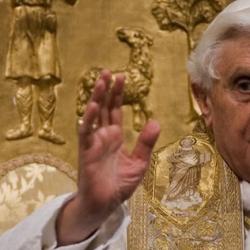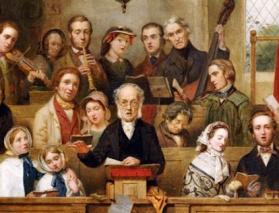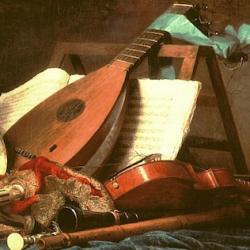Bruce Ellis Benson (Improvisation of Musical Dialogue) doesn’t think that “the binary schema of ‘composing’ and ‘performing,’ which goes along with the construal of music making as being primarily about the production and reproduction of musical works” describes “what musicians actually do.”
In place of the binary scheme, he offers “an improvisational model of music, one that depicts composers, performers, and listeners as partners in dialogue. From this perspective, music is a conversation in which no one partner has exclusive control.” He admits that “the binary schema of composition/performance always has allowed for a kind of dialogue–and astute composers, performers, and listeners would be quick to point that out.” But he argues that “the dialogical character of music making is not particularly well described by that binary schema and, furthermore, that the binary schema has significantly inhibited genuine dialogue” (x–xi).
To make his case, he sketches a phenomenology of musical experience, in an effort to show that “the process by which a work comes into existence is best described as improvisatory at its very core, not merely the act of composing but also the acts of performing and listening. On my view, improvisation is not something that precedes composition . . . or stands outside and opposed to composition. Instead, I think that the activities that we call ‘composing’ and ‘performing’ are essentially improvisational in nature, even though improvisation takes many different forms in each activity” (2).
Benson critiques a standard model of the relation of composition and performer, in which the composer provides a true work that the performer mediates priest-like to an audience. That view has been held by both composers and performers, but Benson thinks it obscures the fluidity and complexity of both processes.
Early opera scores (Rossini for instance) leave much to the performer, and composers don’t necessarily provide a finished, definitive text. He writes, “the very idea of a ‘correct’ performance of Handel’s Messiah turns out to be highly problematic, for Handel himself never provided anything like a definitive version of Messiah. Instead, all we have are competing versions in which Handel constantly changes all sorts of things to fit the many occasions on which it was performed” (19). Evidence comes from the other direction as well: “Bach was soundly criticized for writing everything out,” including all the embellishments that other composers left to the performer (20).
This doesn’t mean that composition was a free-for-all. Citing Gadamer, Benson points out that dialogues take place within rules, and so does musical dialogue: “like any dialogue, not just anything was acceptable. There were still rules. But, having said that, it is clear that performers were expected to be much more active improvisers than in the dialogue of classical music of today” (21).














